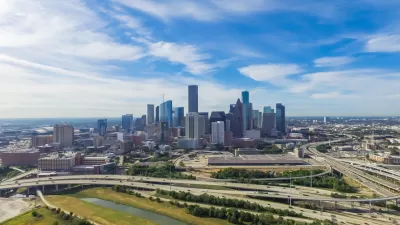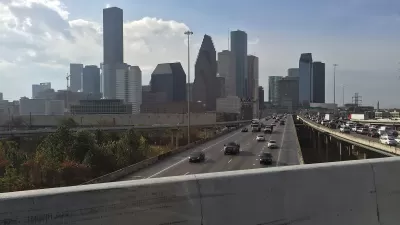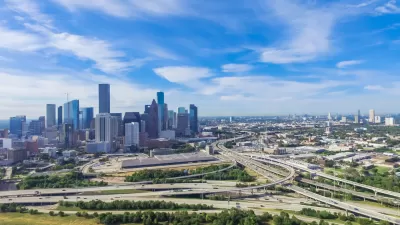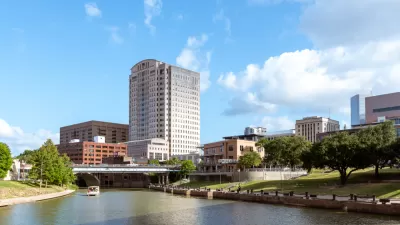With the project still under federal investigation, local and state agencies say they are moving forward with the development of design details for the contentious freeway redesign.

The controversial plan to rebuild and widen parts of Interstate 45 in Houston is once again moving forward after the city and the Texas Department of Transportation (TxDOT) came to an agreement at the end of last year.
As reported by Dug Begley for the Houston Chronicle, details of the agreement, which will require plans for rebuilding Interstate 69 under a light rail line, flood control projects, sidewalks and bikeways, and details for how changes to I-45 will impact connecting roads, remain to be worked out.
Meanwhile, a Federal Highway Administration (FHWA) review of the project and potential civil rights violations is still in progress. As Begley explains, “Though minor changes have reduced some of the effects, TxDOT’s approved project impacts — the catchword for any structure or dwelling directly touched by the changing road boundary — include 158 houses, 433 apartments or condos, 486 public housing units, 340 businesses, five churches and two schools.”
The North Houston Highway Improvement Project has been at the heart of a fierce debate over the future of downtown Houston, with critics calling for a new approach to transportation and mobility that rejects the perpetuation of unsustainable, car-oriented planning. “In a statement, Air Alliance Houston said the agreements ‘will do very little to protect Houston communities from the harms posed by this project,’ specifically related to air pollution caused by the larger freeway in many neighborhoods around the central business district.”
FULL STORY: TxDOT has deal to rebuild I-45, but many details must be worked out before lifting a shovel

Maui's Vacation Rental Debate Turns Ugly
Verbal attacks, misinformation campaigns and fistfights plague a high-stakes debate to convert thousands of vacation rentals into long-term housing.

Planetizen Federal Action Tracker
A weekly monitor of how Trump’s orders and actions are impacting planners and planning in America.

San Francisco Suspends Traffic Calming Amidst Record Deaths
Citing “a challenging fiscal landscape,” the city will cease the program on the heels of 42 traffic deaths, including 24 pedestrians.

Defunct Pittsburgh Power Plant to Become Residential Tower
A decommissioned steam heat plant will be redeveloped into almost 100 affordable housing units.

Trump Prompts Restructuring of Transportation Research Board in “Unprecedented Overreach”
The TRB has eliminated more than half of its committees including those focused on climate, equity, and cities.

Amtrak Rolls Out New Orleans to Alabama “Mardi Gras” Train
The new service will operate morning and evening departures between Mobile and New Orleans.
Urban Design for Planners 1: Software Tools
This six-course series explores essential urban design concepts using open source software and equips planners with the tools they need to participate fully in the urban design process.
Planning for Universal Design
Learn the tools for implementing Universal Design in planning regulations.
Heyer Gruel & Associates PA
JM Goldson LLC
Custer County Colorado
City of Camden Redevelopment Agency
City of Astoria
Transportation Research & Education Center (TREC) at Portland State University
Jefferson Parish Government
Camden Redevelopment Agency
City of Claremont





























